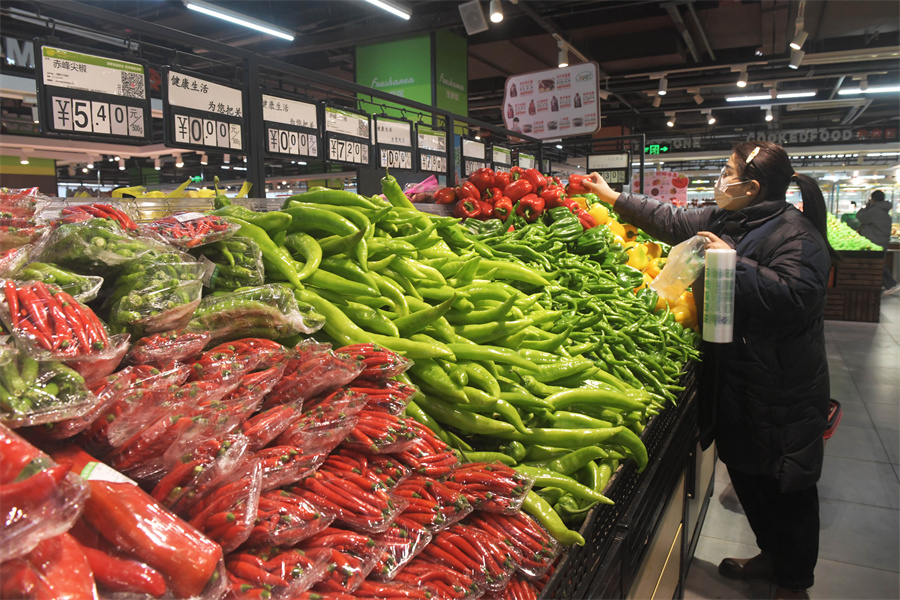Full-year CPI target likely lower at 2%
Among provincial-level regions, 27 out of 31 set inflation goals at such levels


China is likely to lower its annual inflation target to around 2 percent this year — the lowest reading in two decades — when the country's top legislature convenes next month, signaling a significant fine-tuning in macroeconomic policy goals, economists and analysts said.
The reduction would indicate a shift of policy focus from preventing inflation from exceeding a certain threshold to guiding its recovery to a reasonable level, implying an increased weight on promoting reflation and correcting subdued demand via policymaking.
According to the 2025 government work reports of provincial-level regions on the Chinese mainland, the vast majority of these local governments — 27 out of 31 — set their annual consumer price index expectation growth targets at "around 2 percent".
Exceptions include Yunnan province, which did not specify a CPI growth target, and the Xizang autonomous region, which aimed to keep inflation within 3 percent. Hunan province stated that its CPI growth would align with the national level, while Shandong province aims to maintain consumer prices "at a reasonable level".
"CPI targets have been generally lowered to around 2 percent across various regions. It is highly likely that the national target for 2025 will also be reduced from around 3 percent to about 2 percent," said Xiong Yuan, chief economist at Guosheng Securities.
If the national CPI expectation target is lowered to 2 percent, it would mark the first time that the target is set below 3 percent since China started specifying the figure in its national government work report — unveiled at the annual gathering of the National People's Congress — in 2005, when the target was 4 percent.
From 2015 to 2024, the national CPI target was mostly set at "around 3 percent", except for 2020 when the figure was 3.5 percent as COVID-19 hit. In 2015, the target was lowered by 0.5 percentage point to about 3 percent, after another cut in 2013 by 0.5 percentage point to around 3.5 percent.
"CPI target adjustments aren't uncommon in history," Xiong said. "China's CPI growth in 2023 and 2024 were both 0.2 percent year-on-year. It can be quite challenging for CPI growth to rebound to around 3 percent in 2025, making a 2 percent target pragmatic."
Zhang Jun, chief economist of CGS International, said: "Many provinces and cities have lowered their CPI expectation targets from around 3 percent to 2 percent. This change should not be interpreted as a reduced policy focus on inflation, but rather a significant shift in the management target of inflation."
Zhang said that in the past, the aim of setting inflation targets was primarily to prevent economic overheating, with the 3 percent CPI target serving as an upper limit in practice, meaning policies were designed to keep CPI growth from exceeding this threshold.
However, under the goal of promoting a reasonable recovery in prices, a 2 percent CPI growth target may now act as an average inflation goal, suggesting that a reasonable price level should fluctuate around 2 percent, he said, adding that local governments could facilitate this goal by addressing excessive competition.
The tone-setting Central Economic Work Conference in December has called for achieving an optimized mix of "stable growth, stable employment and reasonable price rebounds" as it seeks to expand domestic demand on all fronts.
The National Bureau of Statistics said on Sunday that the country's CPI rose 0.5 percent year-on-year in January, up from a 0.1 percent growth in December, thanks to holiday factors and rising oil prices.
"Inflation is in an early stage of bottoming out and recovering," said Li Chao, chief economist at Zheshang Securities.
Li said that with the implementation of incremental countercyclical policies and the gradual improvement in consumer demand, CPI growth is expected to see a modest rebound in 2025.
"With the Central Economic Work Conference having called for a reasonable recovery in overall price levels, there is still room for monetary policy easing, including reserve requirement ratio cuts and interest rate reductions," Li said.
Dong Yilang contributed to this story.




































